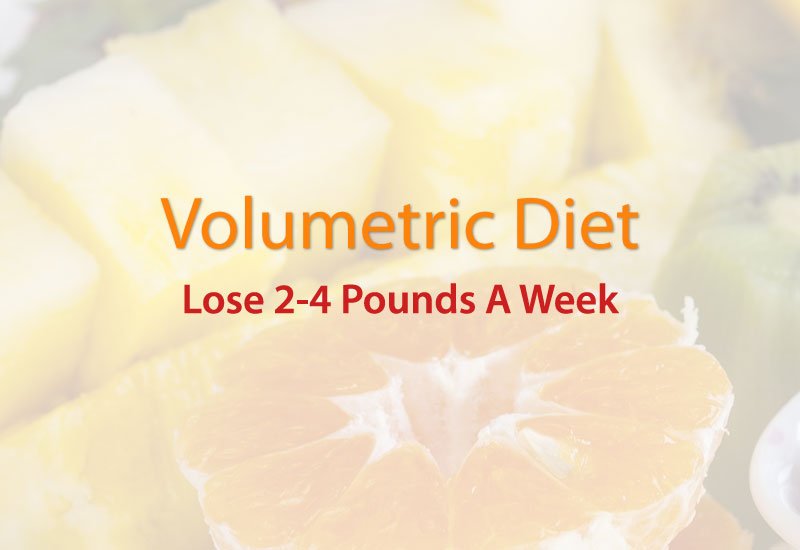 This Volumetric Diet Review talks about ‘The Volumetric Diet’, which is a way of eating that emphasizes quantity over quality when it comes to food choices. Unlike other diets which may restrict foods or require counting calories, this diet focuses on eating lots of nutrient-dense, low-calorie foods to help you attain and maintain a healthy weight.
This Volumetric Diet Review talks about ‘The Volumetric Diet’, which is a way of eating that emphasizes quantity over quality when it comes to food choices. Unlike other diets which may restrict foods or require counting calories, this diet focuses on eating lots of nutrient-dense, low-calorie foods to help you attain and maintain a healthy weight.
This diet is based on the idea that food should fill you up without packing on the pounds and that you should feel satisfied after a meal. With its emphasis on high-fiber and low-fat foods, the Volumetric Diet encourages you to enjoy wholesome, nutrient-rich meals in large quantities.
What Is The Volumetric Diet
A Volumetric Diet is a type of weight loss plan that focuses on eating large volumes of low-calorie foods to create a feeling of fullness while still consuming a calorie-restricted diet. The foods chosen in a Volumetric Diet efficiently provide the body with its required nutrients while also providing enough bulk, effectively eliminating hunger and calorie cravings so that the dieter is able to maintain his or her desired weight. We talk in detail in this volumetric diet review.
History Of Volumetric Diet Meal Plan
The volumetric diet, also known as “volumetrics,” is a dietary approach developed by Barbara Rolls, a professor of nutritional sciences at Penn State University. It is based on the principle that food should be chosen based on its volume rather than its caloric value in order to naturally reduce caloric intake.
Volumetrics was first introduced in 1999 in the book “The Volumetrics Weight-Control Plan”. In her book, Rolls claims that people who are overweight or obese tend to be deficient in certain nutrients and can be helped by replacing some of their calorie-dense foods with nutrient-dense, low-calorie food alternatives. The idea is that reducing calorie intake doesn’t have to mean reducing pleasure.
The book suggests four principles for following the volumetric diet: higher intake of water, increased intake of fruits and vegetables, higher consumption of “good” carbs like whole grains, and reduced consumption of fats.
Rolls also suggests that a person’s diet should include foods with the highest energy density, or calories per gram. She presents her ideas in the form of the “Energy Density Pyramid”. Foods with the highest energy density include fatty meats, full-fat dairy products, biscuits, cakes, and savory snacks. Foods with lower energy density include fruits and vegetables, grains, soups, and low-fat yogurt.
Since its conception, the volumetric meal plan has been endorsed by several medical and health groups, including the American Heart Association for being an effective weight-control strategy. It has been found to be effective for weight loss and in controlling hunger, and is seen as a reasonable approach to controlling obesity in both adults and children.
 Volumetric Diet Weight Loss Results
Volumetric Diet Weight Loss Results
The Volumetric Diet is a popular weight management program that focuses on providing the body with healthy, nutrient-rich foods that are low in calories. This diet has been clinically proven to be effective for weight loss due to its emphasis on eating plenty of nutrient-dense carbohydrates, healthy fats, and lean proteins. The Volumetric Diet also involves making lifestyle changes in order to promote long-term weight maintenance.
When it comes to weight loss results, people can expect to lose 2 to 4 pounds per week, depending on how much caloric deficit they create for themselves. It is important to remember that weight loss results vary from person to person and the same results won’t be seen for everyone on the diet.
According to our Volumetric Diet Review, this is an effective way to achieve long-term weight loss goals as it is low in calories and high in quality nutrients. It teaches you how to make simple, sustainable lifestyle changes in order to maintain your new weight. Additionally, not only will you be seeing weight loss results, but you’ll also be improving your overall health and reducing your risk for chronic diseases.
Volumetric Diet Meal Plan Benefits
1. Improved Digestive Health- Volumetric diets emphasize whole, minimally processed, and unrefined foods, which can help improve your body’s overall digestive health. Eating a diverse range of fruits, vegetables, proteins, whole grains, and healthy fats provides ample dietary fiber, which improves the stool’s bulk and movements and helps nutrition absorption.
2. Better Weight Management- Volumetric meal plan help with weight management by focusing on nutrient-dense, filling foods that are low in calories. Eating a diverse range of low-calorie foods helps to ensure that your body is getting the necessary vitamins, minerals, and other essential nutrients while helping to suppress your appetite and limit excessive snacking.
3. Lower Risk of Cardiovascular Disease- By focusing on low-fat proteins, healthy fats, and whole grains, volumetric diets help to lower your risk of developing cardiovascular disease. Consuming nutrient-rich foods that are low in saturated fat helps to reduce bad cholesterol and improve good cholesterol levels.
4. More Sustainable- A volumetric diet is a much more manageable diet to sustain over time because it focuses on whole, unrefined foods with ample variety so that you won’t get bored with your meals. You will still be able to enjoy treats in moderation without feeling like you are sacrificing taste or pleasure.
5. Better Nutrient Utilization- With volumetric meal program, your body will be better able to use the nutrients from your meals. This is because you are consuming a variety of foods that are naturally filled with vitamins, minerals, and other essential nutrients instead of relying on nutrient supplements.
6. Enhances Performance- Eating nutrient-dense, high-quality foods provide your body with the essential energy it needs for physical activity. This helps to improve your performance during exercise and other activities that involve physical exertion.
7. Reduced Risk of Illness- Volumetric diets help to reduce your risk of illness by providing your body with the proper balance of vitamins and minerals it needs to strengthen your immune system. Eating a diverse range of nutrient-dense foods also helps to provide protection against chronic illness.
Volumetric Diet Meal Plan Cons
1. Risk of Nutritional Deficiencies- A volumetric meall plan relies heavily on non-nutritionally dense foods like fruits, vegetables, and legumes, which are typically very low in calories. This can result in the dieter not getting enough of important vitamins and minerals, such as Vitamin D, iron, and calcium, resulting in nutritional deficiencies. Additionally, those following a volumetric diet may have difficulty fitting in all of the nutritional food groups, such as lean proteins, essential fatty acids, and whole grains, into their daily eating regimen.
2. Limited Variety- A volumetric diet restricts the variety of foods dieters can have. Certain foods, such as high-calorie items like pastries, cakes, and fried foods are off-limits due to their higher caloric densities. Enforcing these restrictions can mean that a dieter will end up eating mostly the same types of food day-in and day-out which can become boring and interesting over time.
3. Constantly Hungry- Since the foods dieters have to eat are low in calories, this can result in them feeling hungrier more often than normal. These hunger pangs can be difficult to manage, resulting in increased cravings for unhealthy snacks and sweets that are not part of the volumetric diet plan. This can lead to binging or overeating and ultimately negating any health benefits that the diet provided.
 Volumetric Diet Plan Do’s
Volumetric Diet Plan Do’s
1. Calorie Cycling- This type of diet involves tracking your calorie intake for one or two days and then switching up your calories on the following days. The purpose of this is to jumpstart your metabolism and keep your body in a state of calorie deficit. This type of dieting also helps to stop your body from becoming too used to one particular calorie intake, thus helping to maintain the weight loss process.
2. Carb Cycling- This diet involves a cycle of high-carb days followed by low-carb days. On your high-carb days, you’ll consume more calories, but your macro ratios of carbs, fats, and proteins will stay the same. On your low-carb days, your calories will stay the same, but you’ll reduce the amount of carbs you take in.
3. Intermittent Fasting- Intermittent fasting has become increasingly popular in recent years. This type of diet involves alternating periods of fasting and eating. You’ll select a certain window of time where you’ll fast, and then select a window of time where you’ll eat. This type of diet helps to optimize your metabolism and can increase your overall metabolism as well.
4. Macro-Nutrient Cycling- The diet involves cycling through your daily macro-nutrient intake. You’ll designate certain days to high-carb days, and certain days to low-carb days. This type of diet helps to maintain a healthy balance of carbs, fats, and proteins and can help to keep your metabolism from becoming too used to a certain type of diet.
Volumetric Diet Don’ts
1. Don’t Drink Excessive Amounts Of Fluids- While water is essential to health, drinking large amounts of fluids can cause you to consume more than your allotted calorie and macronutrient goals set forth by a volumetric diet. This can lead to unwanted weight gain and health issues.
2. Don’t Exclude Vegetables From Meals- Vegetables contain essential vitamins, minerals, and fiber that provide important nourishment for your body. Additionally, they provide a fair amount of volume for a low caloric cost, which helps promote the volumetric approach to eating.
Volumetric Diet Cost
The Volumetric meal plan is an eating plan based on the principles listed in the book. This book costs around $18-20 depending upon the edition. It is the official book.
Volumetric Diet Review FAQs
Q1: What is a Volumetric Diet?
A1: A volumetric diet is an eating plan that focuses on higher-volume, low-calorie foods that are nutrient-dense and low in added sugars, fats, and salts. It encourages eating plenty of fiber-rich, nutrient-filled fruits and vegetables, whole grains, and lean proteins.
Q2: What are the benefits of a Volumetric Diet?
A2: A volumetric diet encourages a greater intake of nutrient-rich fruits and vegetables, along with whole grains, lean proteins, fiber-rich foods, and unsaturated fats. This type of diet is associated with a reduced risk of chronic disease, improved digestive function, better weight management, and an overall improved sense of health and well-being.
Q3: Are there any restrictions on a Volumetric Diet?
A3: While this type of diet does not have any hard-and-fast rules for what foods you can and cannot eat, it does recommend avoiding high-calorie, low-nutrient foods like processed snack foods, fried foods, sugary drinks, refined carbohydrates, and foods high in saturated fats and added sugars.
Q4: How often should I eat on a Volumetric Diet?
A4: A volumetric diet encourages eating several meals and snacks throughout the day, allowing you to stay fuller for longer throughout the day and maintain a balanced diet.
Q5: Is a Volumetric Diet right for me?
A5: A volumetric diet is a flexible diet that can be tailored to fit individual preferences and lifestyles. However, it’s always best to consult with your physician or a dietician to ensure that it’s the best diet for you.
Conclusion – Volumetric Diet Review
The Volumetric Diet is an effective way of controlling your weight and increasing your overall health. It revolves around focusing more on the number and volume of foods that you eat, rather than their nutritional value.
With a volumetric diet, you can create a wide variety of dishes that are both delicious and healthy, and with its flexibility, you can easily adjust your meals and snacks to fit your lifestyle. With its positive health benefits and customizable options, a volumetric diet can help you take charge of your health and reach your goals.
